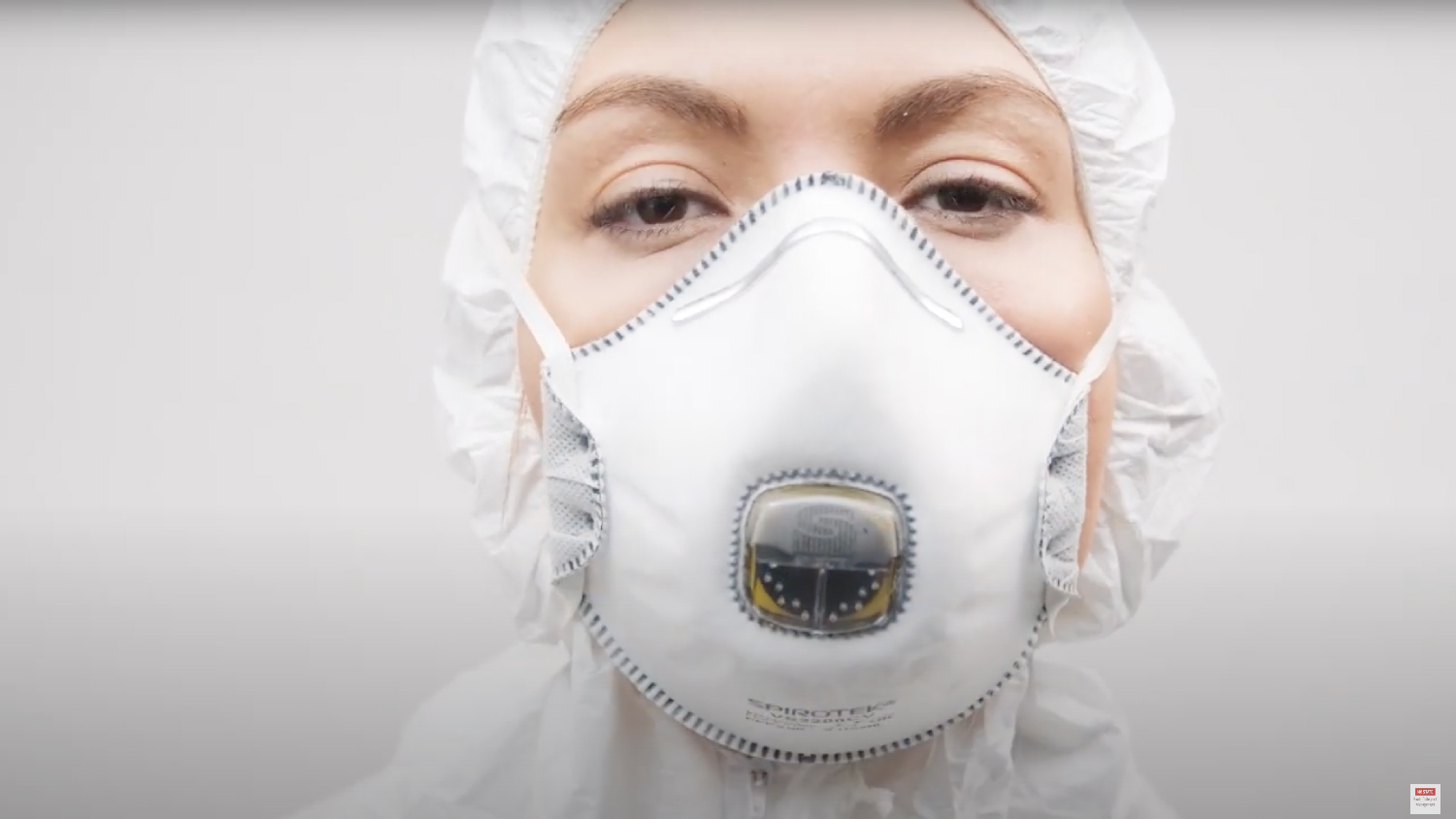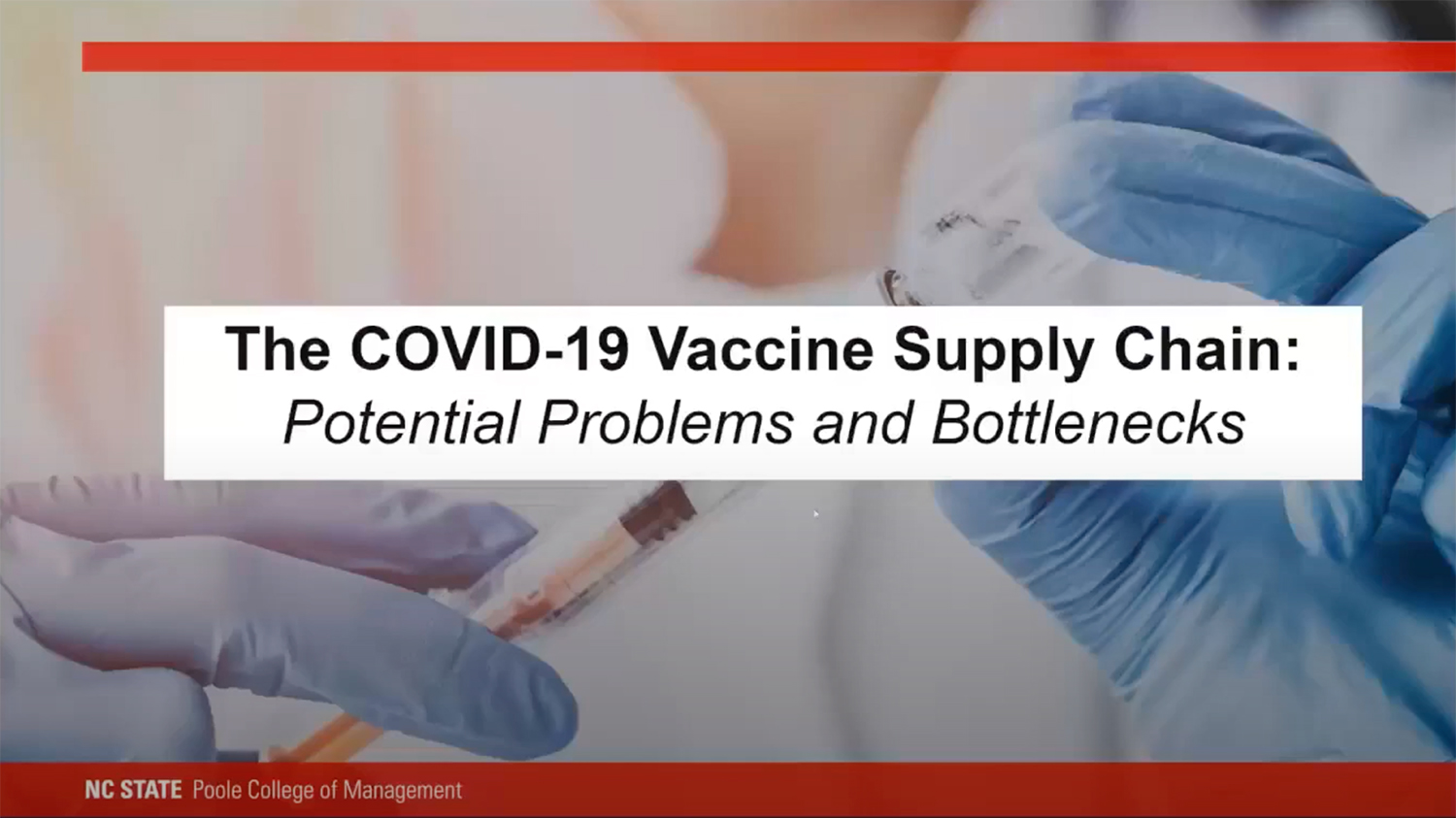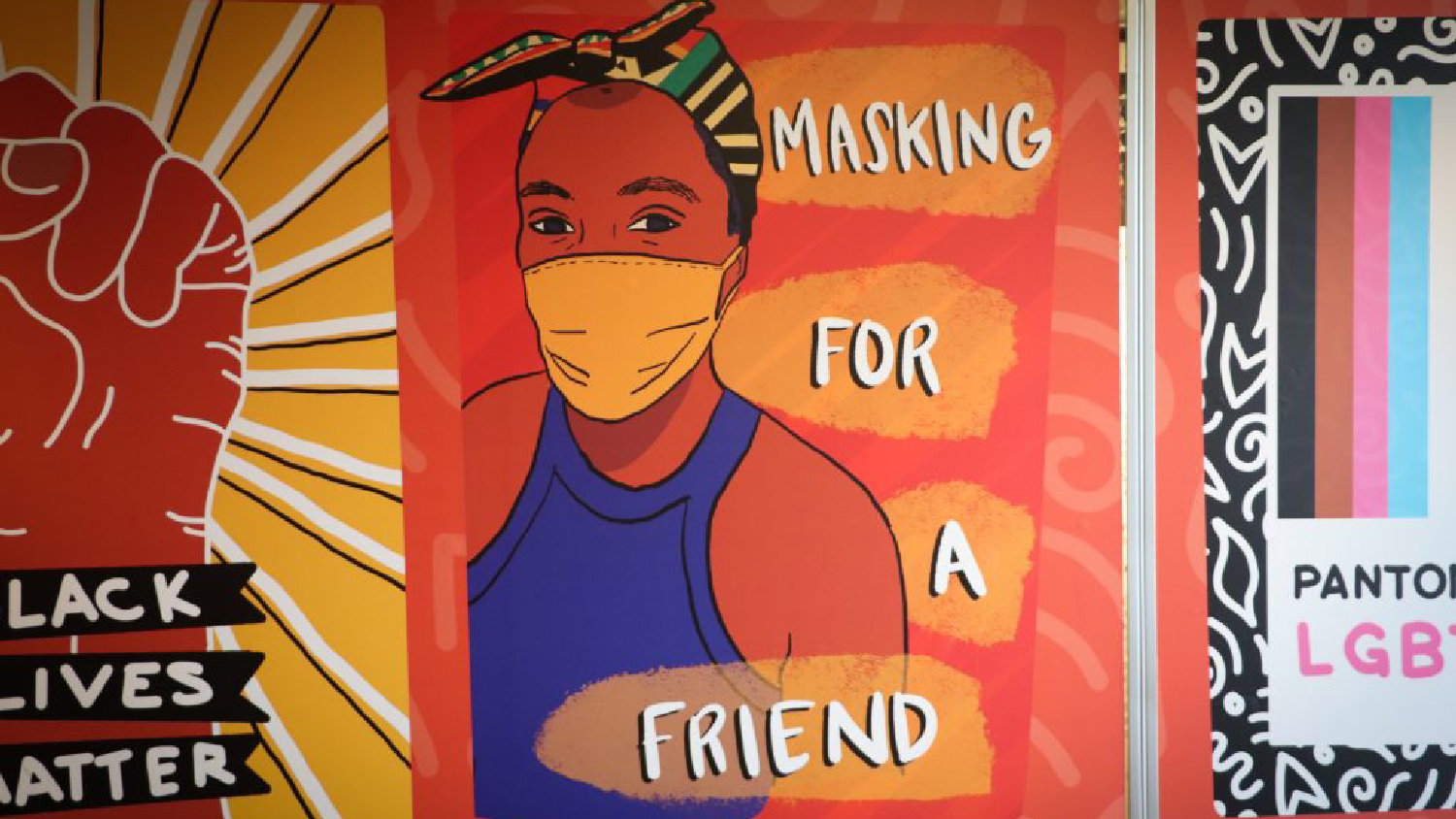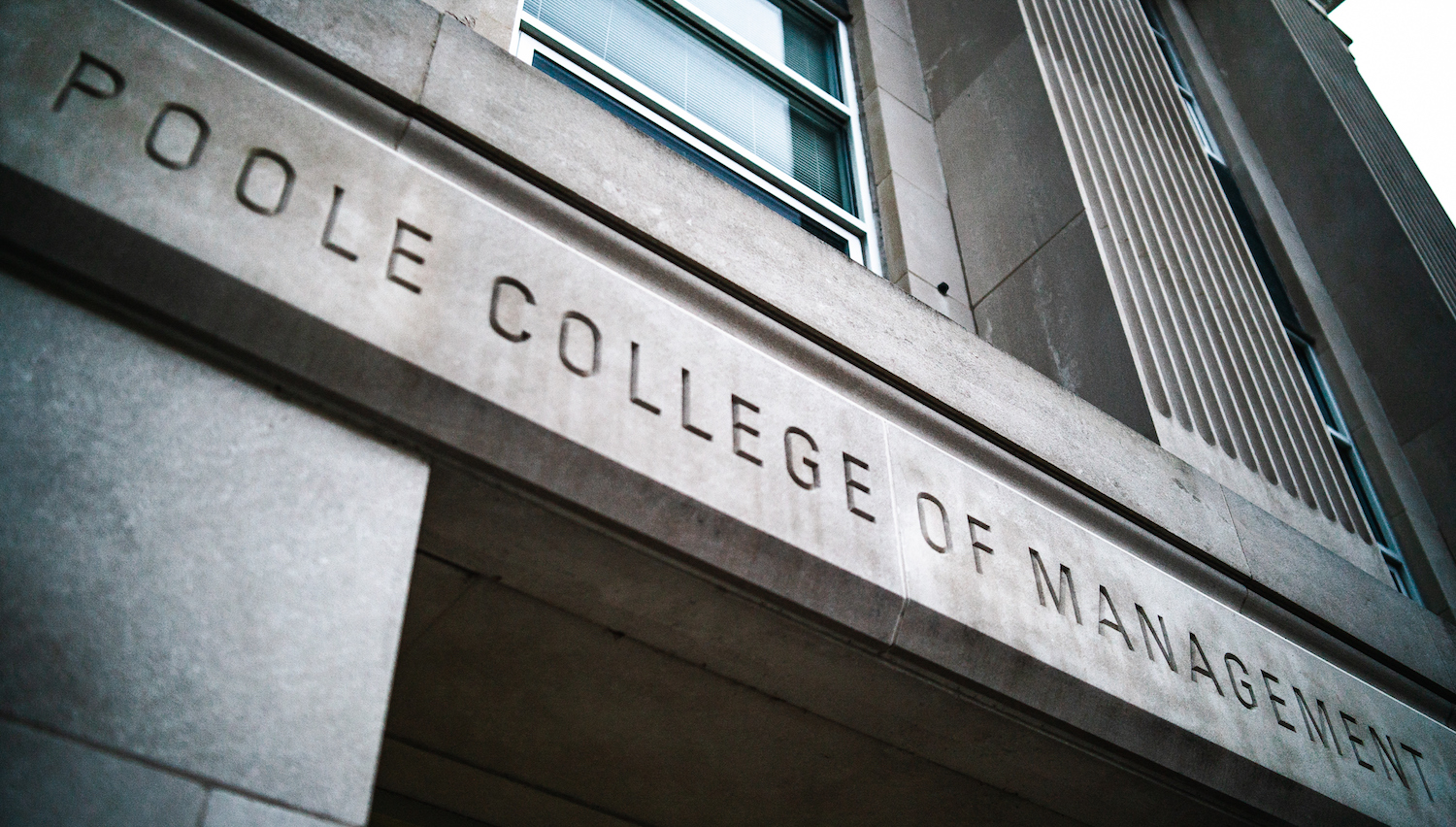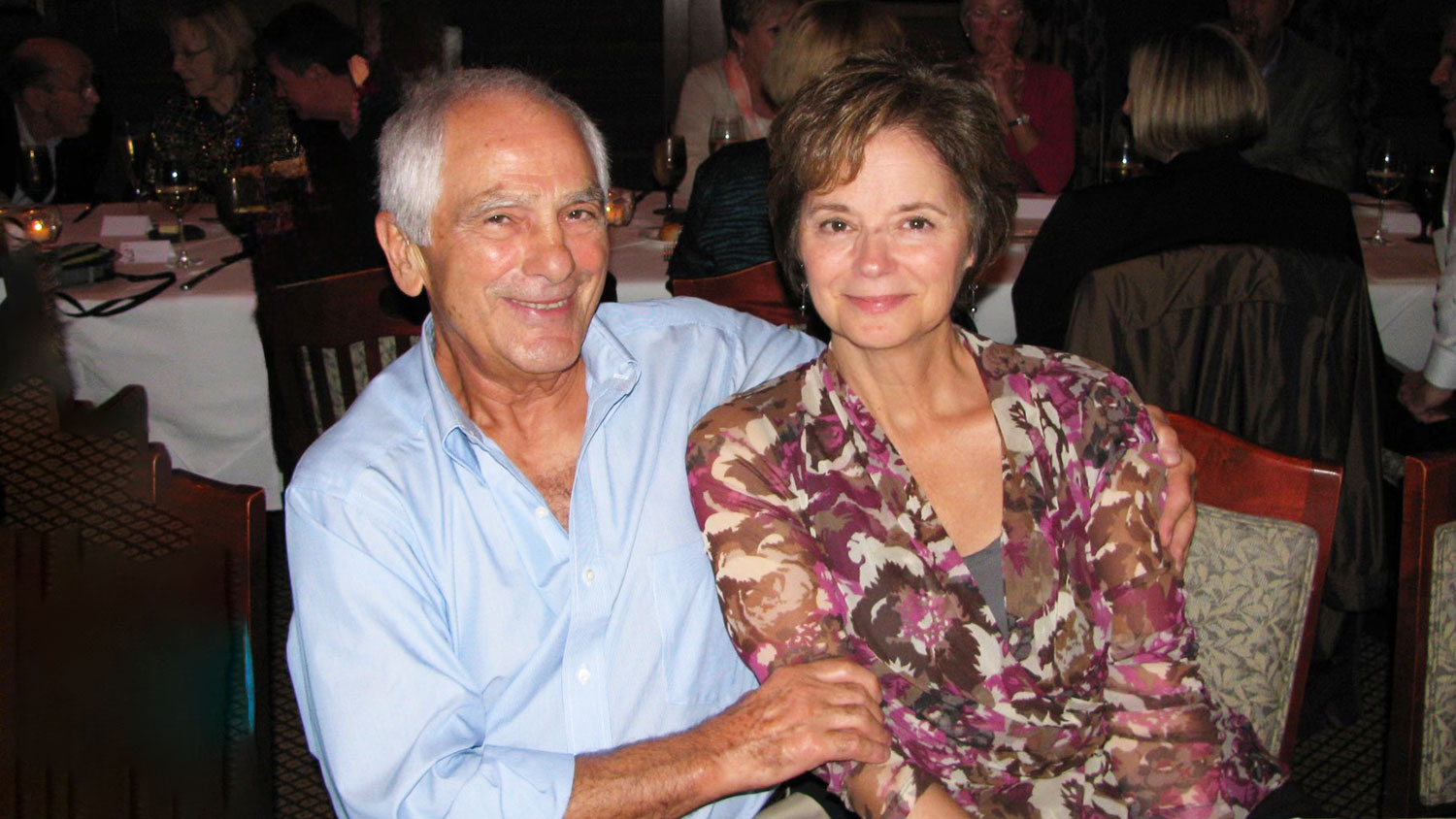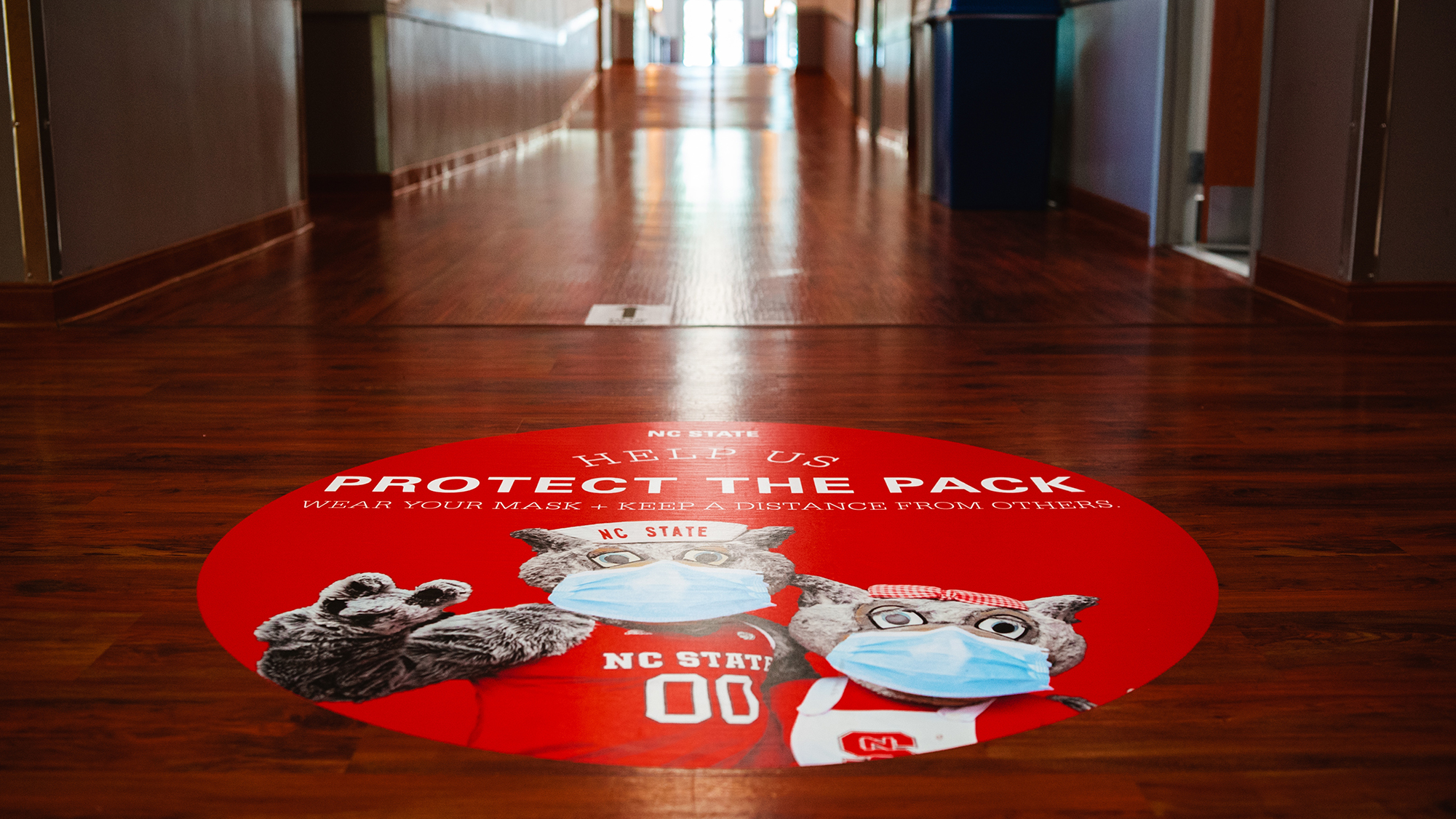
Everybody’s Business: The Year of COVID-19
Faculty, staff and students focused on the fundamentals during a pandemic that challenged assumptions and tested our resolve.
In January 2020, after the World Health Organization suggested that a mysterious outbreak of pneumonia in the Chinese city of Wuhan could be linked to a novel coronavirus, Chinese authorities put the region’s 18 million residents under a strict quarantine. Days later they shut down the most popular section of the nation’s fabled Great Wall in a bid to protect tourists from the potentially deadly pathogen.
But within a few weeks, faculty researchers in the Poole College of Management could see the proverbial writing on the wall — and it didn’t look good. The coronavirus, dubbed SARS-CoV-2 by the international group responsible for naming new viruses, was on the loose. The disease syndrome caused by the virus — COVID-19 — would spread across the global and claim more than 1.8 million lives worldwide in 2020.
In March, shortly after the WHO declared COVID-19 a pandemic and a public health emergency, Poole researchers began assessing the potential impact of the disease.
Economics professor Steve Allen predicted the pandemic would cause job losses throughout the service sector, especially in the hospitality, retail and transportation industries. And he warned of the cascading impact on state and local governments as the resulting decline in economic activity sharply curtailed tax revenues.
Unfortunately, he noted, policymakers had limited options for responding to the downturn. “Standard macroeconomic tools such as cuts in taxes and interest rates will not be effective in this situation,” he said.
Direct payments to consumers, a politically popular policy option, would have limited impact on the economy, he added. “Checks will be saved, not spent, because most of the service economy is going to be shut down.”
Allen said government aid should be targeted to the unemployed. And he advocated government-backed loans to help businesses survive the economic downturn. The federal government’s early response to the pandemic incorporated some of these ideas, including expanded unemployment benefits and the Paycheck Protection Program to help small businesses cover payroll and other expenses.
Storm Warning
Poole faculty offered a range of advice to help businesses weather the storm.
Mark Beasley, professor of accounting and director of the Enterprise Risk Management Initiative, authored an article in the journal ERM Professional Insights calling on managers to take a holistic approach to assessing pandemic-related risks.
“Picture the scene: you have just discovered that your house is on fire and flames are blazing from multiple rooms of the structure. That is sort of where we are right now with this pandemic event,” he wrote in the March 30 article.
Beasley advised businesses to put their people first. “In all emergency situations, including the impact of COVID-19 on a business, the most critical assets are the people — they have to be located and secured first. Nothing else is more important than that,” he explained.
Beasley said business leaders should pinpoint their most valuable core business drivers, identify and prioritize risks triggered by COVID-19 and respond quickly to those risks. “Right now executives need to focus first on protecting or restoring the one or two value drivers that are most fundamental to value preservation,” he said.
Donnie Hale, a lecturer in the Department of Business Management, saw a “looming catastrophe” in April, noting that there was a disconnect between reality and perception in the public mind. “It is hard to get people to act now based on what models predict may happen in the future,” he explained in an article on the Poole Thought Leadership website.
He urged business and policy leaders to leverage data analytics “to develop solutions and think creatively about the path forward.” Among his suggestions: Develop “what if” scenarios based on epidemiological models, then use those scenarios to position your organization for a post-COVID-19 world.
Fay Cobb Payton, University Faculty Scholar and professor of information technology and analytics, examined how the failure of artificial intelligence to reduce health disparities was especially troubling in the age of COVID-19.
“AI is supposed to help determine what kind of health care will be provided to millions of people. The problem is that research continues to show that minority populations are not factored into these algorithms,” she said in an April 15 article on the Thought Leadership website.
There needs to be inclusivity in the room, she said. As new systems and tools are developed, the health care profession needs inclusive workforces and interdisciplinary expertise that can speak to the implicit biases that are often overlooked. “All solutions can’t come from sameness,” she said.
A Time of Disruption
Stefanie Robinson, associate professor of marketing, examined the impact of the pandemic from the consumer’s perspective. A primary driver of consumer behavior, she noted, is scarcity. “Research has shown that when an item becomes scarce, it becomes more desirable,” she said. “That may explain why we have seen a high demand for toilet paper.”

Demand for products such as toilet paper, paper towels and bread flour put pressure on the global supply chain early in the pandemic, drawing the attention of several Poole researchers.
Eda Kemahlioglu-Ziya, associate professor of operations and supply chain management, urged manufacturers to exercise caution. “What we see in terms of products like toilet paper is a typical manifestation of what we call the bullwhip effect in supply chains,” she explained in April. “Even though the actual demand for toilet paper has not changed, people are panic buying. However, because of the inventory people have built up at their houses, we should actually see a drop in demand in the next few weeks or months.
“Manufacturers should not be increasing production capacity, otherwise, they will be stuck with extra inventory. The whole situation with toilet paper should settle down shortly.”
Sebastian Heese, business management department head and professor of operations and supply chain management, noted that many businesses don’t have contingency plans to handle a supply chain disruption. But given the complex, global nature of the supply chain, disruptions were a major issue in the early days of the pandemic.
He predicted these disruptions would force businesses to rethink their supply chain strategies.
“Even before the outset of the crisis, there was a fairly strong global movement away from global integration; this movement was predominantly driven by national politics,” he said. “The coronavirus pandemic might support and accelerate this movement toward more localized production and sourcing.”
Tim Kraft, assistant professor of operations and supply chain management, said having a fast and cost-effective supply chain isn’t enough. In a guest post on the NC State news site, Kraft discussed a concept called Triple-A Supply Chain, which was first proposed by Stanford’s Hau Lee in 2004. Research shows that the supply chains that give companies a competitive advantage display three traits: agility, adaptability and alignment.
Agility refers to the ability to react to sudden changes in demand. Adaptability reflects the ability of a supply chain to adjust to a changing marketplace. Alignment occurs when the interests of retailers, suppliers and manufacturers in the supply chain are aligned so that their individual decision-making helps to optimize the supply chain’s performance.
Looking for Opportunities
Poole researchers focused on ways companies could not only survive the pandemic — but become stronger on the other side.
Roger Mayer, professor of management, innovation and entrepreneurship, advised managers to focus on core competencies, look for new opportunities, redefine priorities and think beyond the current crisis.
“Listen to people at all levels of your company,” he said in a Thought Leadership article. “The key to empowering employees and getting things done beyond your wildest dreams is to ask for help and encourage involvement and provide them with the vision, resources, and support to allow them to make it happen.”
Rishika Rishika, assistant professor of marketing, shared tips for using social media to help businesses stay connected in a socially distanced world.
In an April article on the Thought Leadership site, she advocated weaving social distancing messaging into brand and product stories. “Connecting marketing communications with social messages, especially the ones that are affecting large groups of customers at the same time, can help strike an emotional and caring tone, which resonates with customers and helps strengthen brand equity in the long run,” she said
She also said businesses should take the opportunity to target new customer segments, shore up their online and mobile channels and promote customer social networks.
“In a world where customers cannot connect face-to-face, more opportunities must be created in the digital world to facilitate these connections to not only sustain a company but also strengthen them for the future,” she explained.
Changing Course
While Poole faculty were conducting research and offering expert advice during the pandemic, they and their students were facing COVID-related challenges in the classroom. In both the spring and fall semesters, the majority of courses at NC State were taught remotely.
The switch to remote learning didn’t faze the students in Patrice Nealon’s digital marketing practicum, who were tasked with creating a three-week social media campaign for their clients in the spring semester. Once the pandemic hit, they quickly adjusted their strategies to be sensitive to COVID-19’s impact on businesses.
Nealon, a senior marketing lecturer in the Department of Business Management, worked closely with her students to help them develop marketing content that was both effective and responsive to the world’s business challenges.
“This pandemic is a great lesson in adapting to change. Having the ability to move forward in circumstances beyond your control is a critical skill one needs in business,” Nealon said in May.
Once the pandemic hit, it was wonderful to see how my students responded to their classmates,” Nealon said.
Nealon’s students were located around the globe – in France, Spain and Italy – and spread across the United States. But they managed to keep a sense of togetherness, she said. “Once the pandemic hit, it was wonderful to see how my students responded to their classmates,” Nealon said. “Students were really concerned for each other’s well-being. We had some students who were in heavily impacted areas, so it was great to see the genuine compassion shown by this generation.”
Support System
Scott Showalter, director of the Jenkins Master of Accounting program, was keenly aware of the havoc the COVID-19 pandemic was wreaking on the lives of the 140 students in the program. He asked his fellow MAC faculty members to formally mentor 10 to 15 students each so that every student had someone to turn to with questions or concerns.
Student Victoria Gervasi was thrilled when the mentoring program connected her with Professor of Practice Jennie Dirienzo.
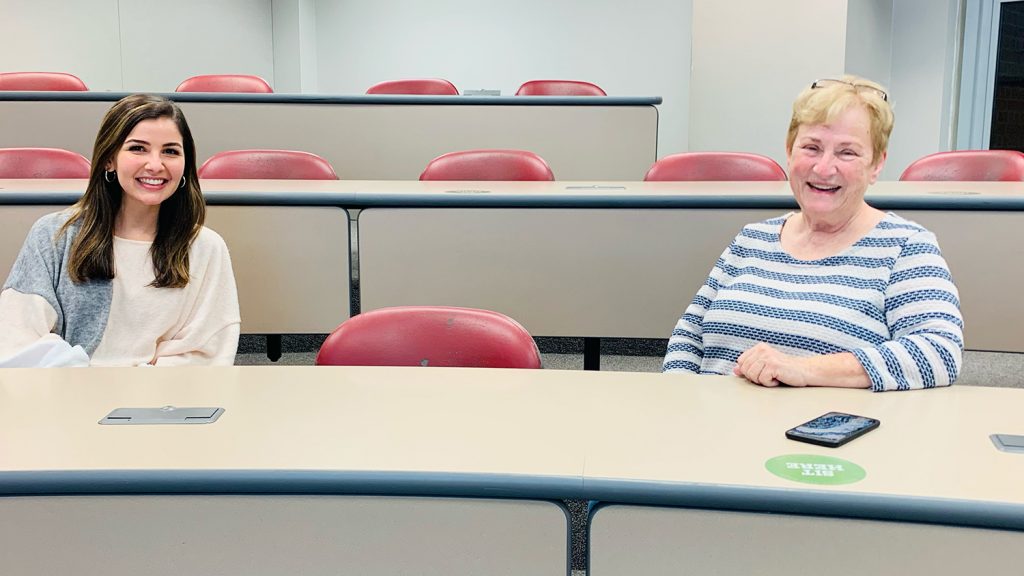
“Jennie was one of the reasons I decided to go into tax accounting in the first place,” she said. “She was one of the first people I felt comfortable enough with to be honest about the stress I was experiencing.”
The support paid off. At the beginning of the semester, Gervasi accepted a full-time job offer from EY. “Victoria has a great deal of potential,” Dirienzo said. “It’s exciting to watch her come into her own.”
Behind the Scenes
Poole staff also played a role in helping the college navigate the pandemic.
Executive assistant Kimberly Whitfield led the task force responsible for preparing buildings for the fall semester and for adapting college operations in the midst of the pandemic. The team helped design plans to encourage physical distancing in college buildings, and it worked to find outdoor spaces where students could gather safely under tents to collaborate.
Whitfield spearheaded the effort to find supplies as well – a time-consuming and challenging process. She was in charge of ensuring that necessary personal protective equipment was available for faculty and staff coming to campus, and that products such as sanitizer and wipes were on hand.
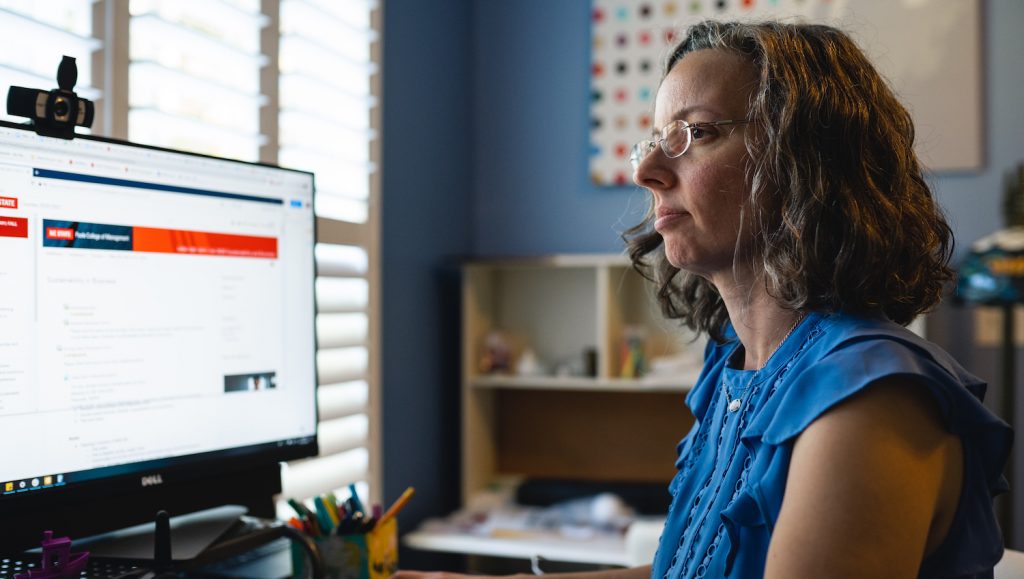
Even before Beth Shepherd became the college’s new director of instructional design in June, she was hard at work supporting faculty through the changes taking place due to COVID-19. She continues to provide training and advice to faculty members transitioning to online instruction.
Shepherd also orchestrated the transition of the Innovative Women’s Conference, an annual event hosted by the NC State chapter of the National Association of Women MBAs, to an online format.
Focus on the Future
With several vaccines now becoming available across the nation and the world, Poole professors are focused on the future, and all its problems and promise.
In a webinar hosted Dec. 16 by the Supply Chain Resource Cooperative, Rob Handfield urged policymakers to pay close attention to the logistical challenges of vaccine distribution. Handfield, the Bank of America University Distinguished Professor of Supply Chain Management and executive director of the Supply Chain Resource Cooperative, warned that the government’s plan seemed to assume everything would go smoothly.
“The more we started to dig into the global supply chain and the vaccine, the more worried we got,” he said.
Among the potential problems he identified were shortages of supplies, limited capacity, vaccine damage, gaps in rural areas and misinformation about vaccines.
Here in North Carolina, one Poole employee is serving on the front lines of the effort to distribute COVID-19 vaccines as quickly as possible. Lisa Chang, director of the Technology Entrepreneurship and Commercialization program and a lecturer in the Department of Management, Innovation, and Entrepreneurship, is also a registered pharmacist who has traveled across central North Carolina to administer vaccine doses in between semesters.
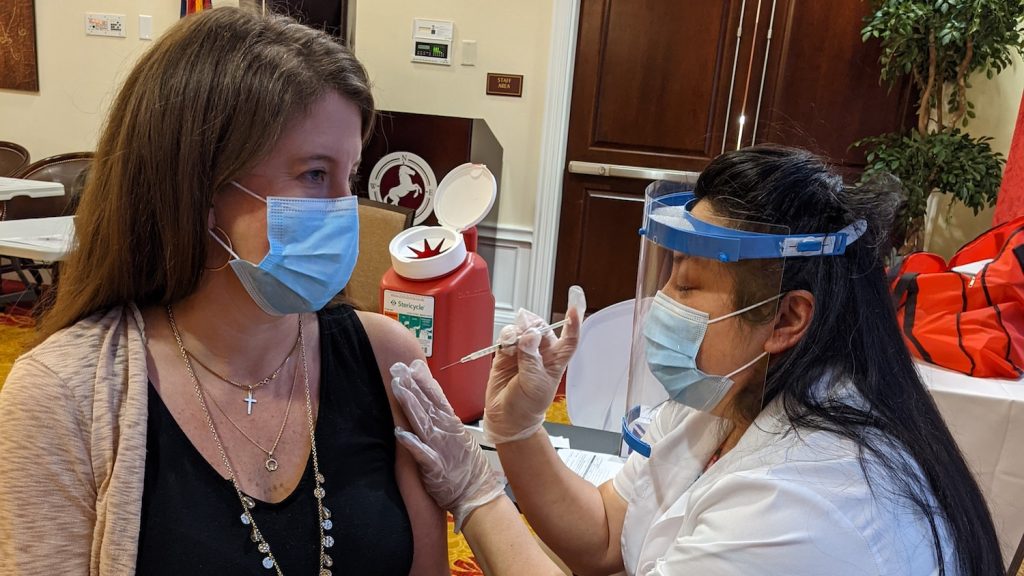
“It’s going to take a large majority of the population getting vaccinated for us to have the best chance to bring COVID-19 under control,” she explained.
Poole researchers are immersed in that issue, as well.
Stacy Wood, professor of marketing and executive director of the Consumer Innovation Collaborative, co-authored a paper in the New England Journal of Medicine titled “Beyond Politics — Promoting COVID-19 Vaccination in the U.S.” Wood laid out several options for encouraging people to get a vaccine, including distributing tokens, such as Livestrong-style bracelets or stickers, to increase consumer buy-in.
“The development of COVID-19 vaccines is an amazing scientific achievement,” she wrote. “Adoption of vaccines by the U.S. public will require a similar level of achievement. Vaccine promotion demands a multifaceted behavioral approach if it is to succeed.”
If this past year is any indication, PCOM faculty, staff and students will do everything they can to help solve this next, big challenge of COVID-19.
- Categories:
